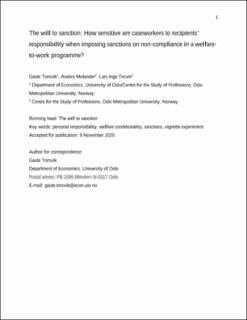The will to sanction: How sensitive are caseworkers to recipients’ responsibility when imposing sanctions on non-compliance in a welfare-to-work programme?
| dc.contributor.author | Torsvik, Gaute | |
| dc.contributor.author | Molander, Anders | |
| dc.contributor.author | Terum, Lars Inge | |
| dc.date.accessioned | 2022-03-25T08:59:52Z | |
| dc.date.available | 2022-03-25T08:59:52Z | |
| dc.date.created | 2021-01-13T09:23:00Z | |
| dc.date.issued | 2021 | |
| dc.identifier.issn | 1369-6866 | |
| dc.identifier.uri | https://hdl.handle.net/11250/2987560 | |
| dc.description.abstract | The activation trend in social policy entails that caseworkers on the frontlines of the welfare state are expected to decide ‘reasonable’ activation requirements for clients and when and how non-compliance should be sanctioned. This study investigates how caseworkers form judgements about their clients’ personal responsibility when activation requirements are violated and how their judgements about responsibility matter for the sanctions they impose. We find that caseworkers are sensitive to personal responsibility, varying the motivation for not fulfilling the activation requirement from a case where the client has less control (circumstances) to one with more control (choice) more than doubles sanctions. | en_US |
| dc.language.iso | eng | en_US |
| dc.publisher | Wiley | en_US |
| dc.title | The will to sanction: How sensitive are caseworkers to recipients’ responsibility when imposing sanctions on non-compliance in a welfare-to-work programme? | en_US |
| dc.type | Peer reviewed | en_US |
| dc.type | Journal article | en_US |
| dc.description.version | acceptedVersion | en_US |
| cristin.ispublished | true | |
| cristin.fulltext | original | |
| cristin.qualitycode | 2 | |
| dc.identifier.doi | 10.1111/ijsw.12472 | |
| dc.identifier.cristin | 1870333 | |
| dc.source.journal | International Journal of Social Welfare | en_US |
Tilhørende fil(er)
Denne innførselen finnes i følgende samling(er)
-
Publikasjoner fra Cristin [3207]
-
SPS - Documents [419]
